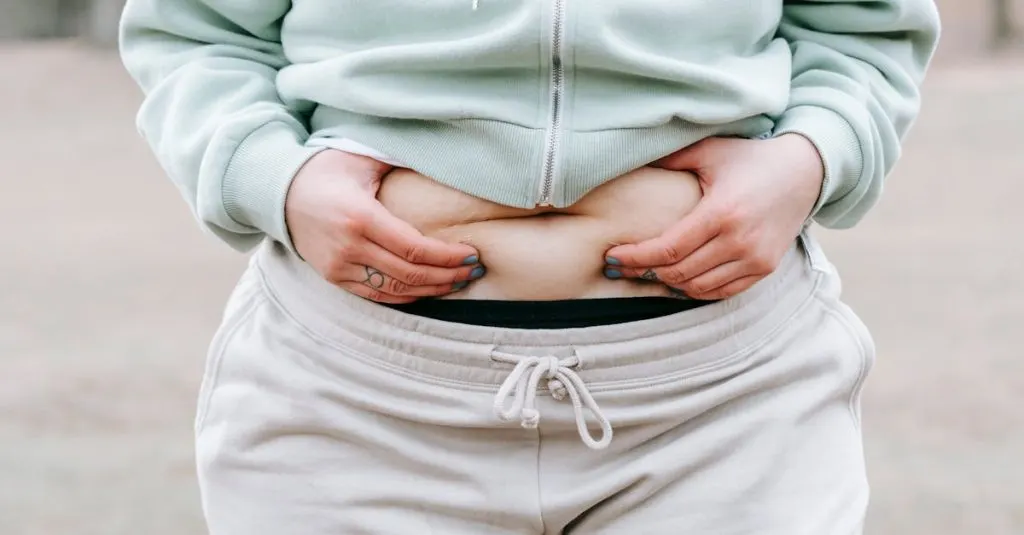A woman in midlife notices that some days she gets very bloated and uncomfortable, so she asks how to reduce bloating during perimenopause so she can feel like her old self again. Jessica explains the different reasons for bloating during perimenopause and offers some actions to take.

Ask Jessica is an advice column for women in midlife. We cover all things related to midlife from changing bodies to career transitions to parenting teens to sandwich generation challenges to shifts in marital or life partnerships and everything in between. My hope is that in sharing these questions and answers I can women as we face the midlife journey together. Got a question or challenge you would like me to address? Fill out this form to submit your issue! Want to see the answers to other questions, check out our archive here.
How to Reduce Bloating During Perimenopause
HEY JESSICA: While I have, so far, managed to side-step the weight gain that many women experience during perimenopause, I am really struggling with bloating. There are days when I start out feeling pretty normal, but by the end of the day it feels like I look like I am 3-months pregnant. It can get so bad that I need to change into sweatpants when I get home from work because my work pants feel so tight (in a way they didn’t in the morning when I put them on)! I’ve heard that this might be yet another symptom of perimenopause. So, how do I reduce bloating during perimenopause so I can feel like myself again? ~Bloat Be Gone
DEAR BLOAT BE GONE:
Yup, that building bloat you are feeling is absolutely a common experience amongst perimenopausal women.
There are a few reasons why this can happen at this stage of life. The first is, of course, changes in our hormones. As our estrogen drops and our progesterone fluctuates, our bodies can get a bit confused and one of the ways the confusion can show up is water retention, which, of course, leads to bloat. A second reason we can experience more bloat as we get older is that, as we age, our digestive systems slow down (this is why older people have smaller appetites). These slower systems can lead to constipation and gas, which, in turn, can lead to bloating. Third, many women, especially women who have given birth, can experience something called diastasis recti. This is when our abdominal muscles weaken to the point where they are no longer able to hold things in the way they used to, which can lead gas and water retention to push your belly out even more. And, finally, some women develop new food sensitivities or even allergies during this stage of life and those sensitivities can lead to increased gas and bloating.
So, now that we’ve established why this can happen, let’s talk about what you can do about it. In terms of water retention, the best thing you can do, perhaps counterintuitively, is to drink more water. Why? Because it helps to flush your system, pushing out the water that your body has been holding onto unnecessarily. Similarly, another thing to do is decrease your salt intake. Salt attracts water, so when we eat too much salt, our bodies tend to retain more water, which means, again, drinking more water can help both to flush your system and to regain your body’s equilibrium.
Now, when it comes to the constipation and gas that comes from our digestive systems slowing down, there are two things that I like to recommend. The first: move more. Exercise increases our blood flow, which, in turn, helps to get our systems moving better so that things get pushed through. Note, the movement/exercise doesn’t have to be super strenuous, just enough to get your blood pumping a bit more than when we are sitting all day—so, go for a walk, do some yoga, or go for more exertion, if that’s what you enjoy. In addition, 250-500mg per day of magnesium can help to get our systems moving more effectively. However, do make sure to talk to your doctor before starting magnesium because there are certain health conditions where it is contraindicated, especially issues with your kidneys. One thing I don’t recommend, though, is to use a laxative. Laxatives should really only be used for emergency situations, rather than as a regular solution, because our bodies can become dependent on them to keep your system moving.
If you think you might be experiencing diastasis recti, then the best thing you can do is seek out a certified physical therapist, preferably one who has experience working with the issue. PTs can help you to re-strengthen those abdominal muscles so that they can go back to holding things in as they should.
And, finally, if you suspect that your bloating is triggered by certain meals or types of foods, I would recommend doing a food journal for a few weeks to see if there are any patterns. For this food journal, you don’t need to count calories or note serving sizes, all you are doing is noting down what you ate and drank and then also noting when you experience bloating (or other symptoms). This can help you to identify foods that may be triggering your bloat and which may be foods that you are increasingly sensitive to. This doesn’t mean that you need to avoid those foods completely, it just can be a helpful piece of knowledge to have so that you can then make informed decisions that work for you.
So, Bloat Be Gone, I hope this helped to reassure you that you aren’t alone in this and that I gave you some ideas about how to combat those bloating incidents. Good luck!
